This story was co-published with AfroLA, nonprofit solutions journalism for Los Angeles told through the lens of the Black community. To republish this article, please contact AfroLA. Subscribe to AfroLA’s newsletter.

A demonstrator sits across from the Federal Building in downtown Los Angeles holding the African-American Flag during the No Kings Protest — a symbolic blend of the Pan-African colors and the U.S. flag pattern, representing African diaspora identity. (Image credit: Michelle Zacarias)
Guerline Jozef often finds herself navigating two worlds: One where she presents as a Black woman in the United States and one where she is treated as an immigrant. As co-founder and executive director of San Diego-based nonprofit Haitian Bridge Alliance, Jozef said her dual identities underscore a deeper complexity in the U.S. immigration debate.
Conversations around immigration, especially in Los Angeles, have long centered on Latinx communities. But Black communities aren’t outsiders to the immigration struggle — they are central to it.
"The reality is, within Black America, immigration has always been an issue, but it has never been part of our identity," said Jozef.
Jozef spoke candidly about the importance of recognizing the intersections of Black and immigrant identities during moments of increased raids. "When we speak about who is a Latinx person, Blackness is never a part of that narrative,” said Jozef, emphasizing that many forget Haitians are part of the Latinx Diaspora.
Los Angeles has one of the quickest-growing Black immigrant populations on the West Coast, especially for those from the Caribbean. L.A. County is home to nearly 73,000 Black immigrants, according to a USC Dornsife Equity Research Institute report on the state of immigrants. One in five Black Angelenos are either immigrants themselves or have at least one immigrant parent.
“When we talk about [Stokely] Carmichael, who led the Black Panthers, we forget that he himself was an immigrant. When we talk about Malcolm X, we forget that his mother was an immigrant from the Caribbean,” she said. “When we talk about Shirley [Chisolm], when we talk about Cicely Tyson…We forget that she herself was an immigrant – and then we come to the [former] President of the United States, [Barack] Obama. His father was from Kenya.”
Jozef said these are examples of how immigration has always been an issue in Black America, even if it is not the primary way Black people identify.
“When I show up, I don't show up as a Haitian American person. I show up as a Black woman in America unless there is a specific reason why I have to address my immigration connection,” Jozef explained. “I think Black folks assimilate very quickly… because we are Black America, and the struggle of Blackness is America. The moment you come to the United States, that becomes your struggle.”
Increasing threats to Black immigrants
An American Civil Liberties Union report, released June 4, 2024, detailed what threats a second Donald Trump Administration posed to immigrant families and the country’s immigration system. “People of all immigration statuses, including U.S. citizens and lawful permanent residents, could be investigated, questioned, and even arrested by these agents if they are at a location that the deportation force decides to ‘hit,’” the report warned.
Since immigration operations began June 6, U.S. Immigration and Customs Enforcement and Customs Border and Protection have detained 3,640 individuals in the L.A. area, according to a senior Department of Homeland Security official contacted by AfroLA. But there have been multipleaccounts of lawful residents and citizens being followed, confronted, detained and even deported.
U.S. citizens can’t be legally deported. But, a data analysis by the federal Government Accountability Office found ICE deported 70 potential U.S. citizens from FY 2015 to FY 2020. But the actual number could be much higher, said GAO, because of ICE’s poor data tracking.

Black demonstrators join anti-ICE rallies in downtown Los Angeles, driving through the streets during the No Kings Protest on June 14, 2025. (Image credit: Michelle Zacarias)
As the Trump Administration ramps up efforts to crack down on immigration, fears of deportation are heightened in Black immigrant communities. This month, a federal judge in New York blocked an attempt to end Temporary Protected Status, or TPS, which offers relief as raids increasingly target Black and Afro Caribbean immigrants in California and across the country.
The ruling halts efforts to terminate TPS for Haitians, preserving the Biden Administration’s 2024 extension of the program. Although this protection allows up to 500,000 Haitians to live and work legally in the U.S., it isn’t a path to legal permanent residency or citizenship. But it does shield many from deportation amid increasing raids and enforcement actions.
Ongoing anti-ICE protests are a continuation of longtime resistance to systemic racism, policing and borders. The more than 4 million Black immigrants living in the United States, about 15% of which are undocumented, face disproportionate rates of detention, deportation and criminalization.
In 2022, Freedom for Immigrants, an immigrant-led, abolitionist organization, reported Black migrants are subject to abuse, racism and violence at a rate disproportionately higher than non-Black migrants while in ICE custody. While the Black migrant population in ICE detention is 6%, 28% of all abuse-related reports made to Freedom for Immigrants’ hotline came from Black migrants.
The discourse around race and immigration is often divisive, even though the impacts of immigration enforcement aren’t colorblind. Jozef notes that the violence by the police upon Black communities turns into the deportation pipeline.
"Being Black in America as an immigrant is a trifecta — criminalized, over-policed, and then deported,” Jozef said.
Division between Black communities and non-Black Latinxs
Many Black voters expressed concern over a national exit poll, which estimated 55% of Latinx men supported Trump. But, the reality is more nuanced. “While there were [more than] 36 million Latinxs eligible to vote in this election — they were still only 15% of the total pool of eligible voters across the country,” reported CALÓ News last year.
Still, users on X (formerly Twitter) speculated that anti-Black sentiment among some Latinx community members may have contributed to Democratic candidate Kamala Harris’s electoral defeat.
Some Black social media users explained why they wouldn’t support Latinx communities in nationwide protests against Trump’s immigration crackdown on social media. “They voted for mass deportations and Project 2025,” a Haitian-founded social justice group posted on Instagram.
Other social media posts encouraged Black followers to avoid protests for threats of police violence toward them, and some Black women specifically suggested Black people should rest instead of risking danger in the streets after others had been hurt.
“We are gonna persevere, but we cannot pour from an empty cup. So I encourage all of you to rest, recalibrate and think about ways to get in the fight,” Erica Loewe, special assistant to President Biden and Chief of Staff for engagement, told Essence Magazine prior to Trump’s inauguration.
Since taking office, Trump has taken unprecedented steps, including attempts to strip legal protections like TPS from Haitian refugees, to initiate what he calls the “largest deportation program” in U.S. history. What's often missing from online conversations, though, is that ICE raids and detentions also impact Black communities.
In the months leading up to the election, Jozef was one of many Black voters knocking on doors and canvassing in hopes of electing Vice President Kamala Harris. She is among the 92% of Black women who voted for Harris. She believes in resting after showing up and voting as a Black woman, but she said she did not have that opportunity.
“My immigration status was still on the line,” Jozef said.
How Black and Brown solidarity groups have supported Angelenos targeted by ICE
Many Black activists are connecting the dots between systems of state violence: The same institutions that police and incarcerate Black people also drive ICE raids and border enforcement. For many, ICE is just another arm of the carceral system. These protests reflect a growing, unified movement demanding an end to state-sanctioned violence, whether it’s at the hands of police or immigration agents.
For the past 35 years, South Los Angeles grassroots group Community Coalition (CoCo) has united youth, residents and service providers for social change. Black and Brown solidarity has always been a part of its DNA, said Marsha Mitchell, senior communications director.
Mitchell said that since the Trump administration sent 700 Marines and 2,000 National Guard troops to L.A., Community Coalition has worked to support the undocumented surrounding community.
“Many of our staff are in mixed status families and that's Black and Brown,” Mitchell said. “We have some Black staff who are Caribbean, from Haiti, from Trinidad. This is an issue that really hits close to home. So that causes a lot of anxiety for us and anxiety for them.”
When the ICE raids started, said Mitchell, Community Coalition staff immediately got to work. They became Know Your Rights trainers and started educating the general public on what legal protections they have.
Black Women for Wellness partnered with Community Coalition and more than two dozen other Black-led or Latinx-led organizations to hold a Black in Solidarity press conference on June 24. Many of the leaders expressed how Black people have been overpoliced and criminalized for decades.
Janette Robinson Flint, co-founder and executive director of Black Women for Wellness, addressed the crowd: “We are here, in Leimert Park, and the police had this big raid this morning where they took away two Black women,”according to an L.A. Sentinel report. “When I look at the militarization of our city in Los Angeles, it’s not just ICE — it’s LAPD, department of border control, Homeland Security but all of those are fingers of the same and we need to recognize that and figure out how do we respond to it.”
A small group gathered did oppose the conference’s goal, calling for “reparations over immigration rights.”
Mitchell called attacks of immigrants from various backgrounds “crimmigration.” As described in a 2006 American University Law Review issue, crimmigration uses criminal and immigration law as tools to create an exclusionary class. “Only the harshest elements of each area of law make their way into the criminalization of immigration law, and the apparatus of the state is used to expel from society those deemed criminally alien.”
“This administration started off saying that they were going after people who were criminals, and that's not what happened,” Mitchell said.
A local vendor and her husband were confronted by ICE agents at Florence and Normandie Avenues in early June, said Mitchell. The vendor wasn’t detained, but her husband was taken into custody and will likely self-deport. Community Coalition held a Reclaim Our Streets procession to that intersection on June 29.
“Right now, a lot of people aren't working,” Mitchell said. “They're afraid to go to work, but people still need to eat and bills still need to be paid.” Community Coalition is working with Strategic Concepts in Organizing and Policy Education (SCOPE) to provide mutual aid. “We're trying to support in any way possible to make sure that people stay as safe as they possibly can during this ridiculous period,” she said.
There are simple things people, she said, can do aside from delivering direct help. Get involved with a grassroots organization that is connected to this issue. In educating yourself, you are using your voice. Check in on your neighbors. Walk their children to summer programs and do the grocery shopping for them, she suggested.
“Talk to your family about why this is a Black flight.”
For Black immigrants in California, the stakes remain high. As in Latinx communities, immigration raids have separated families, disrupted livelihoods and instilled fear in people already navigating systemic racial discrimination.
Community leaders are calling for not only the preservation of TPS but for broader protections and pathways to permanent residency that recognize the unique vulnerabilities Black immigrants face within the U.S. immigration system.
“Make no mistake, when they come for one, they will come for all,” Mitchell said. “What happens is that when we fall down racial lines, that's a race to the bottom. No one wins. That's why solidarity is so important.”

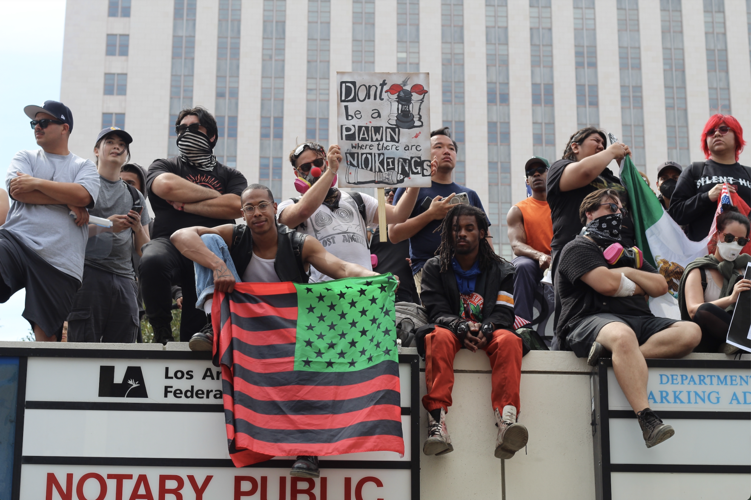
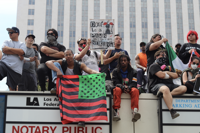
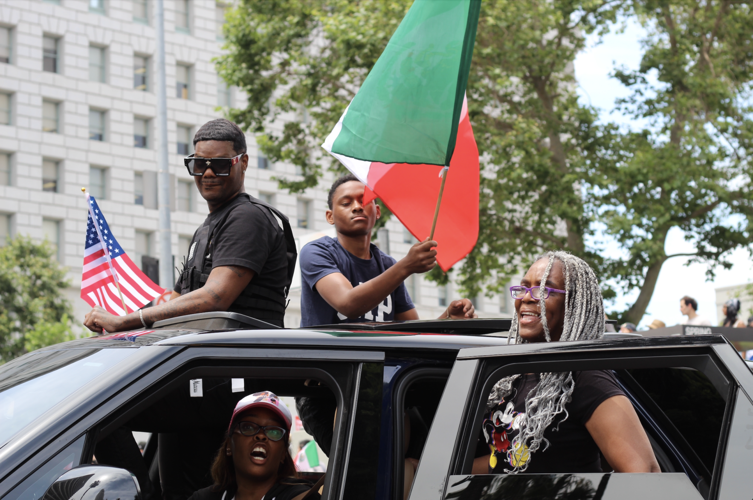




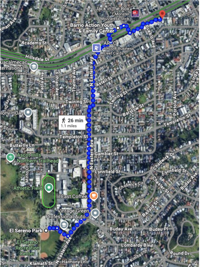



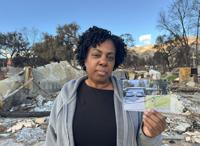
(0) comments
Welcome to the discussion.
Log In
Keep it Clean. Please avoid obscene, vulgar, lewd, racist or sexually-oriented language.
PLEASE TURN OFF YOUR CAPS LOCK.
Don't Threaten. Threats of harming another person will not be tolerated.
Be Truthful. Don't knowingly lie about anyone or anything.
Be Nice. No racism, sexism or any sort of -ism that is degrading to another person.
Be Proactive. Use the 'Report' link on each comment to let us know of abusive posts.
Share with Us. We'd love to hear eyewitness accounts, the history behind an article.